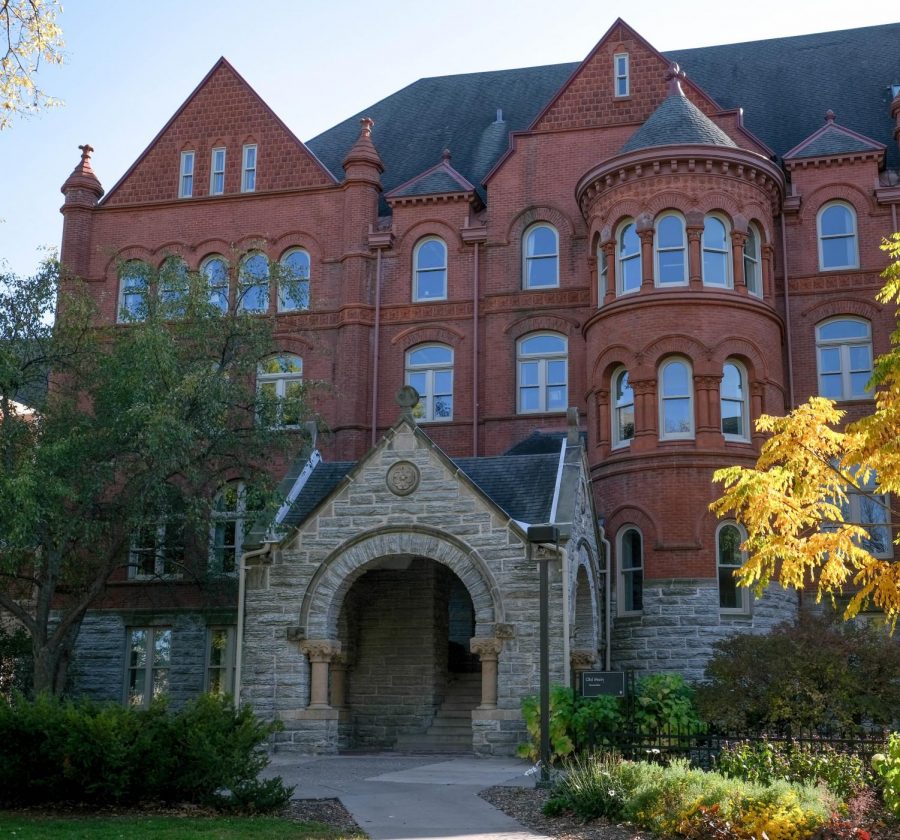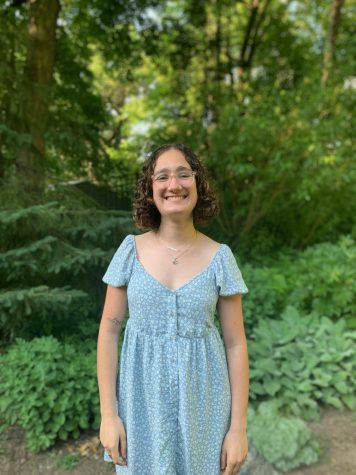Faculty reflect on unprecedented semester
October 8, 2020
Back in May, Provost Karine Moe announced that both semesters during the 2020-2021 school year would be split into two 7.5 week modules in which students took only two classes at a time. Just as the new system and online learning has been difficult for students this semester, professors have had to adapt and overcome circumstances that never would have shown up in a traditional classroom.
Before module one began, professors spent their summers preparing for a semester that would look drastically different than any one before at Macalester. Online and hybrid courses, along with the module system, posed significant challenges for professors as they planned their courses.
Ceramics professor Summer Hills-Bonczyk completely redesigned her course in anticipation of this unprecedented semester. Due to the COVID-19 pandemic and little to no access to the Macalester ceramics studio, Hills-Bonczyk needed to rethink how she taught her classes.
“It really gave me an opportunity to think, what are my values, what do I want to share with my students? As much as it was a ton of work this summer to reconsider things, it was an opportunity for me to re-examine my teaching philosophy,” she said.
Associate professor of educational studies Tina Kruse found the preparation for her courses to be challenging but also rewarding. Kruse recognized that she needed to take her semester-long content and edit it to fit the 7.5-week module.
“For me, that meant taking courses I’ve taught for over a decade and critically looking at what is most meaningful to meet the learning objectives but also what is most relevant to consider during crises,” Kruse wrote in an email to The Mac Weekly. “I think the result is a more purposeful syllabus and course perspectives that offer immediate utility to students.”
Kruse teaches courses such as social and emotional learning and educational psychology at Macalester, and she acknowledged how her expertise in these subjects informed her preparation and scheduling for her courses. Her background helped her plan and pace her courses, understanding that students often struggle to digest large amounts of information in a short amount of time.
“My content expertise also has helped me in pacing my course material… no one can retain too much too fast,” Kruse wrote. “It’s better pedagogy to give attention and depth to key points than to fly past a broad set that students won’t remember.”
When the school year started, the professors’ summer of preparation was put into practice. Because of the compressed module system, the fall semester took off quickly. Students and professors alike have had to adjust to the faster pace of 7.5 week classes.
Chair of the psychology department and Dewitt Wallace professor of psychology Eric Wiertelak is teaching two courses in this module.
“Teaching two [courses] is kind of fascinating in terms of how much there is to do,” Wieretalk said. “With the fast pace of the seven and a half weeks that we have, from start to finish, doing both of those simultaneously is a surprising amount of work and kind of takes up all of your day.”
Dewitt Wallace professor of mathematics, statistics, and computer science Tom Halverson echoed Wiertelak.
“Meeting everyday and doing things faster is hard for me, just getting everything ready every day,” Halverson said. “I really believe that, at least in learning math, downtime is important… So that’s hard, to see students, you know, you come into class and we say, ‘remember what you did yesterday? Well now we’re gonna take off from there and go forward — it’s intense.’”
Printmaking professor Ruthann Godollei sees this compressed module system as putting unneeded pressure on the arts. In a normal semester-long semester, Godollei appreciated the time her students had to develop and sit with their artistic ideas.
“The [module] system has not been a favor to the arts — it’s so compressed that you don’t get time to develop an idea or get back to things very much,” she said. “The space of a semester gives you time to work things through conceptually as well as physically, and we are missing some of that.”
Hills-Bonczyk, who also teaches a visual art class at Macalester, is trying to work within the constraints of the module system and remote learning to give her students the most hands-on experience. While she noted that the module has been tough, she saw it as an opportunity to push her creativity to a new level.
“Right now we have a lot of constraints, and you could see that as a barrier, or you could see that as an opportunity to get more specific and think outside of the box, and that’s what I’ve been trying to do as a teacher and encouraging my students to do,” she said.
Brian Lush, chair and associate professor in the Classical Mediterranean and the Middle East department understands that, in order to work within the constraints of the module system and online learning, he needed to re-evaluate how much material he could reasonably cover in just seven and a half weeks..
“[This] can be a difficult thing to do because we’re so ambitious in our teaching and we want to accomplish so much with our students and we know how talented that you all are,” Lush said. “So I think that you got to simplify, at least from my perspective, where you dial things in, to a point where you can accomplish as much as you possibly can without having unreasonable expectations given the limits of remote teaching.”
For some Macalester professors teaching during module one, there are not only changes between different semesters or modules, but also possible changes within this module. The first weeks of classes fell within the college’s quiet period. During that time, classes could only meet online. After the quiet period ended, some professors began meeting with their students in classrooms or outside socially distanced.
“Now that the quiet period is over, my FYC will meet once a week in a hybrid way — outside, in small groups, with remote students joining via Zoom,” assistant history professor Jess Pearson said. “I know the ability to learn with fellow students face-to-face is an incredibly important part of a Macalester education.”
Hills-Bonczyk said that even though she can now teach her classes in the traditional studio, social distancing requirements still pose challenges.
“My students right now are in the studio, but I can’t have them gather around my potter’s wheel and get direct feedback on their questions,” Hills-Bonczyk said. “So there’s a slower delivery method for how they learn those skills.”
With all the changes to how faculty and students work together, there is some consistency in having community. Professors are working especially hard during this module to create a sense of interconnectedness among students.
“It’s been rewarding to be able to provide that grounding for students in my class at a time when so much is shifting and uncertain,” Kruse wrote. “It’s like: here’s one thing you can count on — my teaching and our class community.”
Hills-Bonczyk sees this semester as an opportune time to bring her classes closer together — just not physically.
“I do feel like there is a craving to connect and that craving is driving some motivation,” she said. “And that helps a little bit because everyone wants to get to know each other so I am trying to facilitate as many experiences as I can that allow that to happen.”
Godollei wanted to expand her classroom community beyond the figurative walls of their Zoom room. She connected her class to the greater Macalester and surrounding neighborhood’s community by displaying students’ art.
“We are going to have a clothesline show of people on Shaw Field,” she said. “[It’s] a way to share our work with the community.”
Halverson noted that casual moments between students and faculty are crucial to build a sense of community, but those can’t happen right now. Before COVID, Halverson would spend time with his fellow faculty members eating lunch or just chatting about their classes.Now, this social time is much more difficult to sustain.
“We have to work hard to see one another,” Halverson said. “There’s just so much in between community stuff that’s lacking. We would have a department coffee each week, we’re going to do it on Thursdays, but I don’t think it’s the same when we have it over a Zoom screen.”
Not all hope is lost, however. With her FYC, Pearson relished in the opportunity to teach brand-new Macalester students.
“The most rewarding thing has just been getting to know a new group of students,” Pearson said. “After 15 months away from the classroom, it’s been really wonderful to meet a new cohort of Mac students and be part of this pandemic learning adventure together.”
Lush saw the possible disconnect between him and his students as a chance to reevaluate who he was for them and he’s started sharing more of himself with his students.
“I present myself as a kind of fuller human being… [and]make other aspects of my identity, my background, my personality available,” Lush said. “We can’t all be in the same room together., so, it requires more generosity and more trust on my part to bridge that gap.”
Wiertelak and Kruse both recognized that, while this is a difficult module under unprecedented circumstances, Macalester professors and staff can work together to make it successful.
“We’re all people who have priorities and stuff, and people are doing what they can to stay on top of assignments, get things done and also to share with us when things are going right or what’s going wrong in helping them to make it through the course,” Wiertelak said. “The communication and the cooperation across the faculty-student population, I think is really impressive.”
“It’s been hard for everyone, and we should acknowledge that,” Kruse wrote. “What we’re all doing is no small feat! But we can do hard things when we learn from each other, with each other, and from our own mistakes. Ultimately I think we’ll be stronger teachers and students from these times.”














